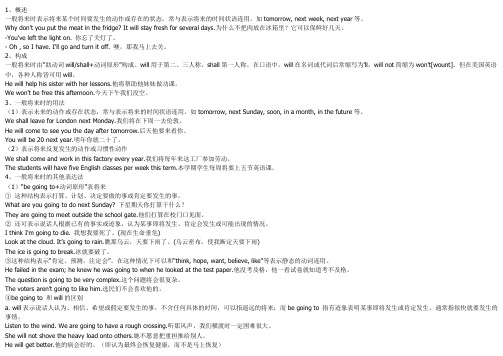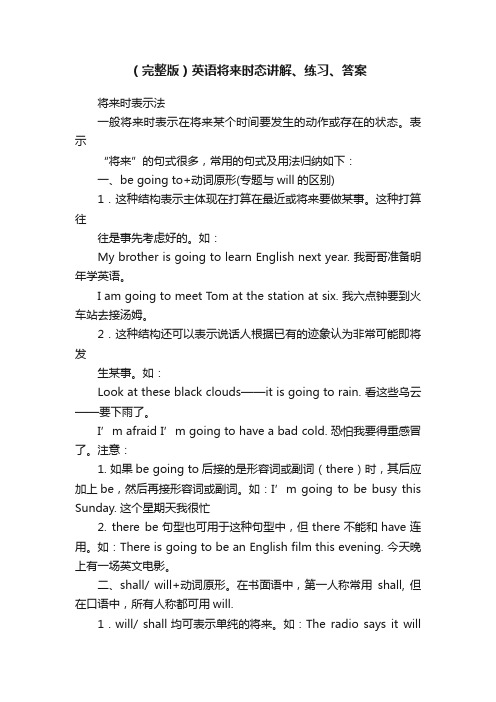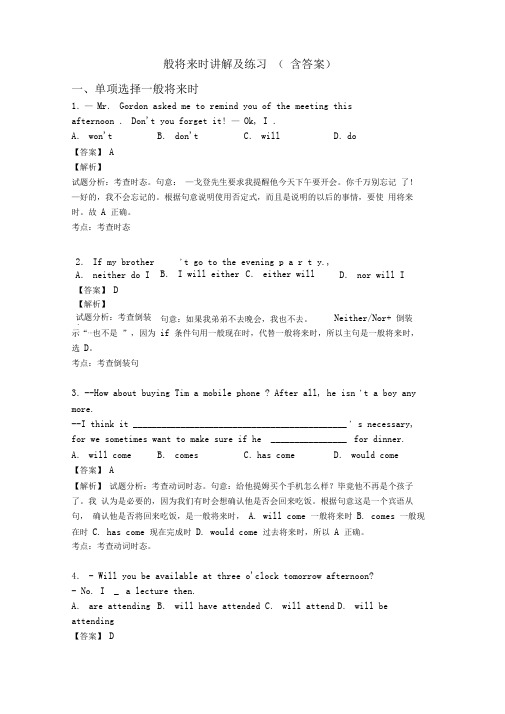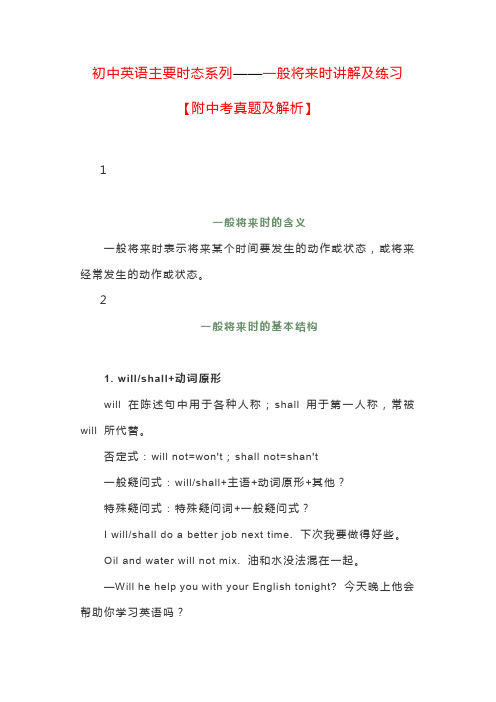英语将来时态讲解、练习、答案
(完整版)一般将来时态讲解及练习和答案

1、概述一般将来时表示将来某个时间要发生的动作或存在的状态,常与表示将来的时间状语连用,如tomorrow, next week, next year等。
Why don’t you put the meat in the fridge? It will stay fresh for several days.为什么不把肉放在冰箱里?它可以保鲜好几天。
-You've left the light on. 你忘了关灯了。
- Oh , so I have. I'll go and turn it off. 噢,那我马上去关。
2、构成一般将来时由“助动词will/shall+动词原形”构成。
will用于第二、三人称,shall第一人称。
在口语中,will在名词或代词后常缩写为'll,will not简缩为won’t[wount]。
但在美国英语中,各种人称皆可用will。
He will help his sister with her lessons.他将帮助他妹妹做功课。
We won't be free this afternoon.今天下午我们没空。
3、一般将来时的用法(1)表示未来的动作或存在状态,常与表示将来的时间状语连用,如tomorrow, next Sunday, soon, in a month, in the future等。
We shall leave for London next Monday.我们将在下周一去伦敦。
He will come to see you the day after tomorrow.后天他要来看你。
You will be 20 next year.明年你就二十了。
(2)表示将来反复发生的动作或习惯性动作We shall come and work in this factory every year.我们将每年来这工厂参加劳动。
[语法]初中英语一般将来时讲解与练习(含答案)
![[语法]初中英语一般将来时讲解与练习(含答案)](https://img.taocdn.com/s3/m/c26c830e17fc700abb68a98271fe910ef12dae32.png)
初中英语:一般将来时专项练习题1.People in Urumqi are glad that Subway Line One by the end of the year 2017.A.will complete B.will be completedC.has completed D.is completed【答案】B【解析】【详解】句意:乌鲁木齐的人们很高兴地铁1号线将在2017年底完工。
will complete将要完成,一般将来时态;will be completed一般将来时的被动语态;has completed现在完成时;is completed一般现在时的被动语态。
根据句意可知,that从句中的主语Subway Line One与动词complete构成被动关系,应使用被动语态。
再根据句中的时间状语by the end of the year 2017可知,这里用一般将来时态,故选B。
2.The 31th Olympic Games _______ in Rio de Janeiro of Brazil in 2016. A.is held B.will holdC.will be held D.is going to hold【答案】C【解析】【详解】试题分析:句意:第31届奥运会将于2016年在巴西里约热内卢举行。
举办奥运会,The 31th Olympic Games在句中作主语,用被动语态。
2016年将要发生的动作,用一般将来时态。
故选C。
【考点定位】:考查动词时态及语态辨析。
3.Half of the work _________ in two days.A.will finish B.will be finished C.have beenfinished D.has been finished【答案】B【解析】【详解】句意:这项工作的一半将在两天后完成。
考查被动语态。
【最新】初中英语一般将来时讲解与练习(含答案)

初中英语:一般将来时专项练习题1.If we do something the law, we will .A.against; punished B.with; be punishedC.with; punished D.against; be punished【答案】D【解析】【详解】句意:如果我们做了违法的事,我们将被惩罚。
against反对;with 和…...一起;结合句意,我们做了违反法律的事,应被惩罚,主语we与谓语publish之间是被动关系,故用被动语态,位于助动词will 后,故用动词原形,故选D。
2.It is reported that a space station ______ on the moon in a few years. A.was built B.will be builtC.is built D.has been built【答案】B【解析】【详解】试题分析:句意:据报道,几年后月球上将要建空间站。
表示几年后将要发生的动作,用一般将来时态,主语space station是谓语动词build的承受者,用被动语态。
故选B。
考点:考查动词的时态、语态辨析。
3.The Olympic Games ______ in Tokyo in 2021.A.hold B.will hold C.are held D.will be held 【答案】D【解析】【详解】句意:奥运会将于2021年在东京举行。
考查被动语态。
hold一般现在时;will hold一般将来时;are held一般现在时的被动语态;will be held 一般将来时的被动语态。
根据“in 2022(将来的时间)”可知此句时态是一般将来时,可排除AC选项。
主语“The 24 Winter Olympics”是动词held的受动者,需使用被动语态,可知使用被动语态,故选D。
4.A new mobile cabin hospital(方舱医院) ________ next time you come here.A.is completed B.was completed C.completedD.will be completed【答案】D【解析】【详解】句意:下次你来这的时候,一个新的可移动方舱医院将会完工。
(完整版)英语将来时态讲解、练习、答案

(完整版)英语将来时态讲解、练习、答案将来时表示法一般将来时表示在将来某个时间要发生的动作或存在的状态。
表示“将来”的句式很多,常用的句式及用法归纳如下:一、be going to+动词原形(专题与will的区别)1.这种结构表示主体现在打算在最近或将来要做某事。
这种打算往往是事先考虑好的。
如:My brother is going to learn English next year. 我哥哥准备明年学英语。
I am going to meet Tom at the station at six. 我六点钟要到火车站去接汤姆。
2.这种结构还可以表示说话人根据已有的迹象认为非常可能即将发生某事。
如:Look at these black clouds——it is going to rain. 看这些乌云——要下雨了。
I’m afraid I’m going to have a bad cold. 恐怕我要得重感冒了。
注意:1. 如果be going to后接的是形容词或副词(there)时,其后应加上be,然后再接形容词或副词。
如:I’m going to be busy this Sunday. 这个星期天我很忙2. there be句型也可用于这种句型中,但there不能和have连用。
如:There is going to be an English film this evening. 今天晚上有一场英文电影。
二、shall/ will+动词原形。
在书面语中,第一人称常用shall, 但在口语中,所有人称都可用will.1.will/ shall均可表示单纯的将来。
如:The radio says it willbe cloudy tomorrow. 收音机报道明天多云。
2.表示预料中将要发生的动作或情况。
如:You’ll feel better after having this medicine.吃了这药,你就会感到好些的。
一般将来时讲解及练习(含答案)

般将来时讲解及练习(含答案)一、单项选择一般将来时1.—Mr.Gordon asked me to remind you of the meeting thisafternoon .Don't you forget it! —Ok, I .A.won't B.don't C.will D.do【答案】A【解析】试题分析:考查时态。
句意:—戈登先生要求我提醒他今天下午要开会。
你千万别忘记了!—好的,我不会忘记的。
根据句意说明使用否定式,而且是说明的以后的事情,要使用将来时。
故A 正确。
考点:考查时态2.If my brother doesn 't go to the evening p a r t y.,A.neither do I B.I will either C.either willI D.nor will I【答案】D 【解析】试题分析:考查倒装句:句意:如果我弟弟不去晚会,我也不去。
Neither/Nor+ 倒装句,表示“⋯也不是”,因为if 条件句用一般现在时,代替一般将来时,所以主句是一般将来时,选D。
考点:考查倒装句3.--How about buying Tim a mobile phone ? After all, he isn 't a boy any more.--I think it _____________________________________________ ' s necessary, for we sometimes want to make sure if he ________________ for dinner. A.will come B.comes C.has come D.would come【答案】A【解析】试题分析:考查动词时态。
句意:给他提姆买个手机怎么样?毕竟他不再是个孩子了。
我认为是必要的,因为我们有时会想确认他是否会回来吃饭。
【语法专练】初中英语一般将来时讲解与练习(含答案)50题

初中英语:一般将来时专项练习题1.If you see the cartoon films, you will __________ laugh.A.be made B.makeC.make to D.be made to【答案】D【解析】【详解】句意:如果你看卡通电影,你会被逗乐的。
短语make sb. do sth.表示使某人做某事;被动语态是sb. be made to do sth.表示被使得去做某事。
根据题意,故选D。
2.The 31th Olympic Games _______ in Rio de Janeiro of Brazil in 2016. A.is held B.will holdC.will be held D.is going to hold【答案】C【解析】【详解】试题分析:句意:第31届奥运会将于2016年在巴西里约热内卢举行。
举办奥运会,The 31th Olympic Games在句中作主语,用被动语态。
2016年将要发生的动作,用一般将来时态。
故选C。
【考点定位】:考查动词时态及语态辨析。
3.--Have you washed the clothes?--Not yet. But they__________in half an hour.A.wash B.will wash C.will be washed 【答案】C【解析】【详解】句意:——你洗衣服了吗?——还没有。
但是它们将在半小时之后被洗。
考查动词的被动语态。
wash动词原形;will wash一般将来时态形式;will be washed一般将来时态的被动语态形式。
联系上下语境并结合此句用的是现在完成时态,可知衣服还没有洗。
根据短语in half an hour,in+时间段,用在一般将来时中,意为“在…之后”,主语是“they”指的是衣服,所以此处应用一般将来时的被动语态,表示衣服将被洗。
一般将来时的被动语态构成是will+be+动词的过去分词,此空应填will be washed,故选C。
语法专练初中英语一般将来时讲解与练习(含答案)50题

初中英语:一般将来时专项练习题1.The 24th Winter Olympics in China in 2022.A.hold B.will hold C.are held D.will be held 【答案】D【解析】【详解】句意:第24届冬奥会将于2022年在中国举行。
考查被动语态。
in 2022是将来的时间,用于一般将来时,需借助will构成,可排除AC 选项。
主语The 24 Winter Olympics是动词held的受动者,需用被动语态,可排除B项。
根据句意结构,可知选D。
2.He has ordered a watch on line for his father and it _______ to him before Father’s Day.A.send B.will be sent C.was sent D.sent【答案】B【解析】【详解】试题分析:句意:他在网上为父亲订了一块表。
将在父亲节前寄给他。
It指代的是“表”,作主语,与谓语动词send是逻辑上的动宾关系,it是其承受者,用被动语态;从时态上看,表将在父亲节前寄给他,用一般将来时态,故选B。
考点:考查动词时态及语态辨析。
3.The School Art Festival_____ next month. You'd better prepare a talent show.A.holds B.is held C.will hold D.will be held 【答案】D【解析】【详解】句意:学校艺术节在下个月举办,你最好准备一个才艺展示。
考查一般将来时的被动语态。
holds一般现在时;is held一般现在时的被动语态;will hold一般将来时;will be held一般将来时的被动语态。
根据句中的时间状语“next month”可知,本句时态为一般将来时,再根据句意可知,主语“The School Art Festival”和谓语hold为逻辑上的动宾关系,应用被动语态。
初中英语主要时态系列——一般将来时讲解及练习【附中考真题及解析】

初中英语主要时态系列——一般将来时讲解及练习【附中考真题及解析】1一般将来时的含义一般将来时表示将来某个时间要发生的动作或状态,或将来经常发生的动作或状态。
2一般将来时的基本结构1. will/shall+动词原形will 在陈述句中用于各种人称;shall用于第一人称,常被will 所代替。
否定式:will not=won't;shall not=shan't一般疑问式:will/shall+主语+动词原形+其他?特殊疑问式:特殊疑问词+一般疑问式?I will/shall do a better job next time. 下次我要做得好些。
Oil and water will not mix. 油和水没法混在一起。
—Will he help you with your English tonight? 今天晚上他会帮助你学习英语吗?—Yes, he will./No, he won't. 是的,他会。
/不,他不会。
—When will you arrive for America? 你什么时候去美国?—Tomorrow. 明天。
2. am/is/are going to +动词原形否定式:am/is/are not going to +动词原形一般疑问式:am/is/are +主语+ going to + 动词原形+其他?特殊疑问式:特殊疑问词+一般疑问式?He is going to spend his holidays in London. 他打算在伦敦度假。
Look at the dark clouds. There is going to be a storm. 看那乌云,快要下雨了。
Is he going to collect any data for us? 他会帮我们收集数据吗?What are you going to do tomorrow? 明天你打算作什么?3一般将来时的用法will+动词原形与am/is/are going to +动词原形的用法虽然都表示将来发生动作或情况,一般情况下能互换。
- 1、下载文档前请自行甄别文档内容的完整性,平台不提供额外的编辑、内容补充、找答案等附加服务。
- 2、"仅部分预览"的文档,不可在线预览部分如存在完整性等问题,可反馈申请退款(可完整预览的文档不适用该条件!)。
- 3、如文档侵犯您的权益,请联系客服反馈,我们会尽快为您处理(人工客服工作时间:9:00-18:30)。
将来时表示法一般将来时表示在将来某个时间要发生的动作或存在的状态。
表示“将来”的句式很多,常用的句式及用法归纳如下:一、be going to+动词原形(专题与will的区别)1.这种结构表示主体现在打算在最近或将来要做某事。
这种打算往往是事先考虑好的。
如:My brother is going to learn English next year. 我哥哥准备明年学英语。
I am going to meet Tom at the station at six. 我六点钟要到火车站去接汤姆。
2.这种结构还可以表示说话人根据已有的迹象认为非常可能即将发生某事。
如:Look at these black clouds——it is going to rain. 看这些乌云——要下雨了。
I’m afraid I’m going to have a bad cold. 恐怕我要得重感冒了。
注意:1. 如果be going to后接的是形容词或副词(there)时,其后应加上be,然后再接形容词或副词。
如:I’m going to be busy this Sunday. 这个星期天我很忙2. there be句型也可用于这种句型中,但there不能和have连用。
如:There is going to be an English film this evening. 今天晚上有一场英文电影。
二、shall/ will+动词原形。
在书面语中,第一人称常用shall, 但在口语中,所有人称都可用will.1.will/ shall均可表示单纯的将来。
如:The radio says it will be cloudy tomorrow. 收音机报道明天多云。
2.表示预料中将要发生的动作或情况。
如:You’ll feel better after having this medicine.吃了这药,你就会感到好些的。
3.will表示人的主观意愿,它带有浓厚的感情色彩。
如:Come earlier tomorrow, or I won’t let you in. 明天早点儿来,否则我不让你进来。
4.在问对方是否愿意或表示客气的邀请或命令时,常用will。
如:Will you go to see a film with us? 你愿意和我们一起去看电影吗?5.shall表示建议或征求对方的意见。
如:Shall we go at eight? 我们八点去好吗?6.表示不以人们的意志为转移的规律。
如:He is fourteen this year, and he will be fifteen next year. 他今年十四岁,明年十五岁。
三、come, go, leave, fly, begin, arrive等表示位置转移的动词用现在时行时表示将来的动作。
如:Mr. Li says he is leaving for Beijing tomorrow. 李先生说他明天将去北京。
The sports meeting is beginning at three this afternoon. 运动会将于今天下午三点开始。
四、在条件、时间状语从句中用一般现在时表示将来的动作。
如:If it doesn’t rain, they will climb a hill tomorrow. 如果明天不下雨,他们将去爬山。
I’ll write to you as soon as I arrive home. 我一到家就给你写信。
五、come, go, start, leave等动词的一般现在时也可以表示将来,它是用来根据规定或时刻表示一定会发生的动作或状态。
与现在进行时态一样,一般现在时主要用于往返动作。
如:The train leaves at two o’clock p.m. 火车下午两点钟开。
The new term starts at the beginning of September. 新学期将于九月初开始。
注:表示往返和位置转移动词的一般现在时和现在进行时都可以表示按计划安排将要发生的事,但一般现在时表示“不可改变或不可随便更改的事件或计划”,所以常用于时刻表;而现在进行时表示将来“按计划安排的事可能会改变”。
六、用“情态动词+动词原形”也可表示将来。
这种形式一般用于比较明显的表示将来的时间状语的句子中。
如:You must get up early tomorrow. 你明天必须得早起。
七、用“has better+动词原形”也可以表示将来。
如:You’d better go to see your sister next week. 下周你最好去看看你妹妹。
八.“be to+动词原形”表示按计划要发生的事或征求对方意见。
例如:①Ar e we to go on with this work?我们继续干吗?②The boy is to go to school tomorrow.这个男孩明天要去上学。
九.“be about to+动词原形”表示即将发生的动作,意为:很快,马上。
后面一般不跟时间状语。
例如: We are about to leave.我们马上就走。
十、“be due to"构成的谓语,意味“定于…”也可表示将来时PS :will与be going to 的分别be going to与will的区别be going to与will两者都可表示将要发生的事、将要去做某事,但它们有如下几点区别:1. be going to 表示近期、眼下就要发生的事情,will 表示的将来时间则较远一些,如:He is going to write a letter tonight.He will write a book one day.2. be going to 表示根据主观判断将来肯定发生的事情,will表示客观上将来势必发生的事情。
He is seriously ill. He is going to die.He will be twenty years old.3. be going to 含有“计划,准备”的意思,而 will 则没有这个意思,如:She is going to lend us her book.He will be here in half an hour.4.在有条件从句的主句中,一般不用 be going to, 而多用will, 如:If any beasts comes at you, I'll stay with you and help you 时间状语1)tomorrow, the day after tomorrow, tomorrowmorning/afternoon/evening2)next year/week/month/hour/day/century3)in+一段时间4)in the future5)this afternoon/Sunday/evening6)from now on7)one day, someday (未来的)某天8)soon形式●will 常简略为 'll,并与主语连写在一起,如:I'll,he'll,it'll,we'll,you'll,they'll。
●一般疑问句如用will you…?其简略答语须是Yes,I will或 No,I won't;如用Shall I…?(较少见)其简略答语须是 Yes,I shall.或No, I shall not.一、单项选择。
( ) 1. There __________ a meeting tomorrow afternoon.A. will be going toB. will going to beC. is going to beD. will go to be( ) 2. Charlie ________ here next month.A. isn’t workingB. doesn’t workingC. isn’t going to workingD. won’t work( ) 3. He ________ very busy this week, he ________ free next week.A. will be;is B. is; isC. will be; will beD. is; will be( ) 4. There ________ a dolphin show in the zoo tomorrow evening.A.was B. is going to haveC. willhave D. is going to be( ) 5. –________ you ________ free tomorrow?– No. I ________ free the day after tomorrow.A. Are; going to; willB. Are; going to be; willC. Are; going to; will beD. Are; going to be; will be( ) 6. Mother ________ me a nice present on my next birthday.A. willgives B. will giveC.gives D. give( ) 7. – Shall I buy a cup of tea for you?–________. (不,不要。
)A. No, you won’t.B. No, you aren’t.C. No, please don’t.D. No, please.( ) 8. – Where is the morning paper?– I ________ if for you at once.A.get B. amgettingC. toget D. will get二、动词填空。
1. I ______(leave)in a minute. I ______(finish)all my work before I ______ (leave).2. —How long _____ you _____(study)in our country?—I _____(plan)to be here for about one more year.—I _____(hope)to visit the other parts of your country.—What ______ you ______(do)after you ______(leave)here?—I ______(return)home and ______(get)a job.3. I ______(be)tired. I ______(go)to bed early tonight.4. Mary’s birthday is next Monday, her mother _____(give)her a present.三、句型转换。
